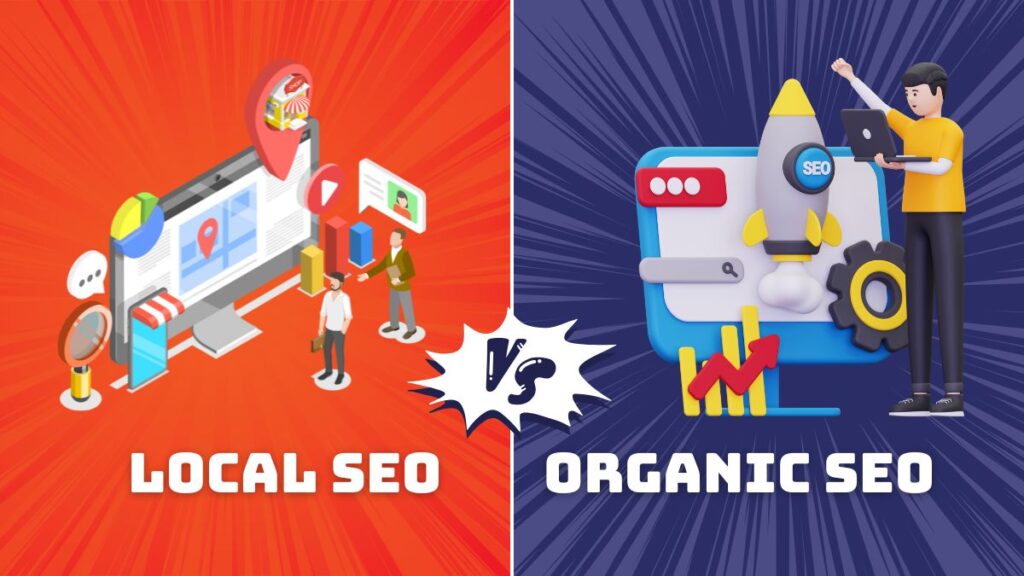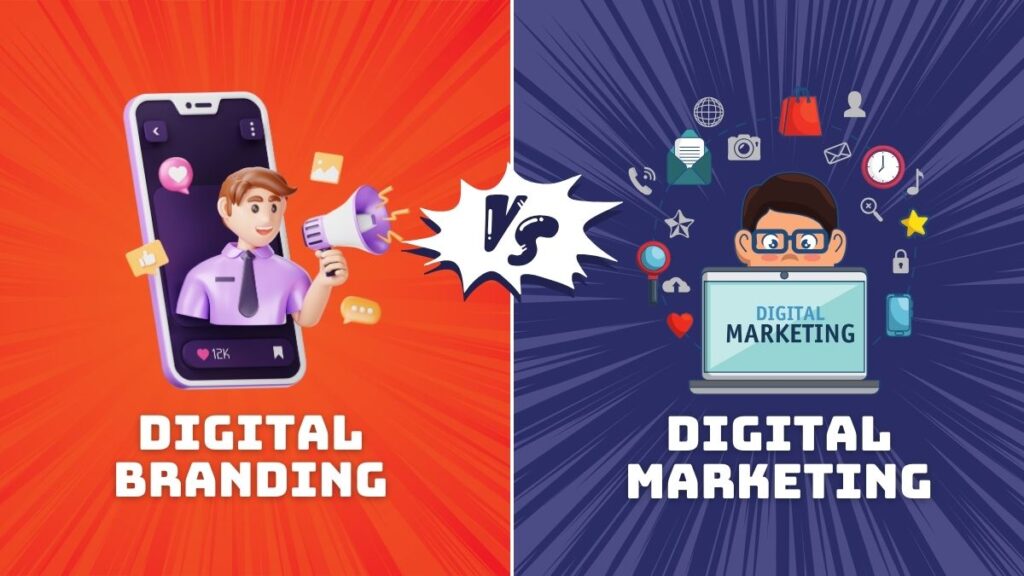Confused about Local SEO vs Organic SEO? Learn the key differences and how each can help your business get noticed online.
Did you know that 46% of all Google searches are looking for local information? And businesses using SEO effectively can see up to 14.6% conversion rates, compared to traditional marketing methods. These numbers highlight why SEO is crucial for any business today.
Think of your business as a shop. Local SEO helps people nearby find you, like a sign right in front of your store. Organic SEO, however, casts a wider net, helping people from all over discover your business online. Both are important, but they each have different strengths.
In today’s world, getting noticed online isn’t just about showing up—it’s about showing up in the right way. Whether you’re a small local business or a large online store, understanding the differences between Local SEO and Organic SEO is key to growing your business.
In this guide, we’ll break down both strategies, compare how they work, and show you how to use them together to reach more customers. Ready to learn how to get your business noticed? Let’s dive in!
What is SEO?
Search Engine Optimization (SEO) boosts a website’s visibility on search engines like Google, helping to attract more visitors and connect businesses with their audience.
Local SEO vs Organic SEO Overview
- Local SEO: Focuses on reaching customers in specific areas or locations.
- Organic SEO: Aims to improve search rankings on a broader, non-geographical scale.
To help businesses understand the differences between Local and Organic SEO, explore their benefits, and learn how to build a successful strategy using both approaches.
What is Local SEO?
Local SEO helps businesses show up in searches by people near them. It’s important for businesses like restaurants, salons, and local services that want customers to visit in person.
Why Local SEO is Important?
Wondering why Local SEO is important? It helps your business show up in local searches, driving more nearby customers and boosting visibility in your community! Let’s explore more
Helps People Find You Nearby: Local SEO makes sure your business shows up when people search close to you.
Example: A pizza shop shows up when someone searches “pizza near me.”
Brings More Visitors to Your Store: It encourages people to visit your physical location.
Example: A local coffee shop attracts more foot traffic through search results.
Builds Community Connections: Local SEO helps strengthen your bond with the people around you.
Example: A local gym gets more members by appearing in community search results.
Improves Trust: Being found in local search results shows you’re a reliable part of the community.
Example: A trusted auto repair shop gets more reviews from local customers.
Boosts Sales: More visibility means more potential customers walking through your doors.
Example: A boutique sees more shoppers after improving their local SEO.
Key Factors of Local SEO
Curious about what makes Local SEO tick? Here are the key factors that can boost your business’s visibility in local searches!
Google My Business (GMB) Optimization: Claim your listing and keep it accurate.
Local Citations: Make sure your business name, address, and phone number are the same across all platforms.
Customer Reviews: Positive reviews help build trust and improve your rankings.
Local Directories: List your business on sites like Yelp and TripAdvisor to get noticed.
Simple Local SEO Tips
Looking to boost your local presence? Here are some simple Local SEO tips that can help your business get noticed by nearby customers
Claim and update your Google My Business listing.
Ask happy customers for reviews.
Use local keywords like “best pizza in Austin.”
Post about your community.
Build links with local websites.
What is Organic SEO?
Organic SEO helps your website rank higher for searches that aren’t based on location. It’s key for businesses aiming to reach a wider, national, or global audience.
Why Organic SEO Matters?
Curious why Organic SEO matters? It’s essential for driving traffic and improving your website’s ranking—without relying on ads. Let’s explore more:
Brings Free Traffic: Organic SEO helps your site show up in search results, so more people visit without you paying for ads.
Example: A bakery appears in searches for “best cupcakes,” bringing in more local customers.
Builds Trust: The more helpful content you share, the more search engines trust you, and the higher your site ranks.
Example: A tech blog gets mentioned by other sites, boosting its reputation and rank.
Attracts the Right People: Organic SEO helps you find people who are already searching for what you offer.
Example: A personal trainer attracts beginners by using keywords like “beginner fitness coaching online.”
Keeps Working Long-Term: Once your site ranks well, it continues to bring traffic without paying for ads.
Example: A small business gets steady visitors after ranking for a popular search term.
Improves User Experience: SEO makes your site faster and easier to use, which keeps people happy and coming back.
Example: A store with a fast, mobile-friendly site makes shopping easier, leading to more sales.
Key Factors of Organic SEO
Wondering what drives Organic SEO? Here are the key factors that can help improve your website’s ranking and visibility!
On-Page SEO: Use relevant keywords in your titles, meta descriptions, and content.
Off-Page SEO: Get quality backlinks from trusted websites to boost credibility.
Technical SEO: Make sure your website is fast, mobile-friendly, and easy to navigate.
Strategies for Organic SEO
Looking to improve your website’s ranking? Here are some simple and effective strategies for boosting your Organic SEO!
Do keyword research to find terms people are searching for.
Create valuable content that keeps people engaged.
Build backlinks from trusted sites.
Improve your website’s speed and make it mobile-friendly.
Use internal linking to guide visitors to more content.
Local SEO vs Organic SEO: A Comparison
Not sure whether to focus on Local SEO or Organic SEO? Both can help your business grow, but they work in different ways. Let’s compare them to help you decide which one is right for you!
| Aspect | Local SEO | Organic SEO |
| Target Audience | Local customers within a specific area | Global or national audience |
| Focus | Improving visibility in local searches (e.g., “restaurants near me”) | Improving rankings for broader, non-geographical searches |
| Key Tactics | Google My Business, local citations, local keywords, reviews | Content optimization, backlinks, broad keywords |
| Best For | Brick-and-mortar businesses, local services (e.g., restaurants, salons) | E-commerce stores, businesses targeting national or global customers |
| Goal | Increase local traffic and foot traffic to physical locations | Increase visibility and traffic on a broader scale |
| Example | Starbucks optimizing for “coffee near me” searches | Amazon optimizing for product-related global searches |
| Result | More in-store visits, local leads | Higher search rankings for a wider audience |
| Tools Used | Google My Business, local directories, local keywords | Website content, blogs, social media, backlinks |
| Content Focus | Location-specific content (e.g., local events, local services) | Broad content targeting general audience interests |
| Ideal for | Local businesses looking to dominate area-specific search results | Businesses aiming for national/global visibility |
Local SEO vs Organic SEO Statistics
Here are some key Local SEO vs. Organic SEO statistics to highlight the impact of each strategy:
Local SEO Statistics
46% of all Google searches are looking for local information (source: Google).
78% of mobile searches for local businesses result in an offline purchase (source: Google).
28% of searches for something nearby result in a purchase within one day (source: Google).
72% of consumers who perform a local search visit a store within 5 miles (source: WordStream).
86% of people rely on the internet to find local businesses (source: BrightLocal).
Organic SEO Statistics
93% of online experiences begin with a search engine (source: Search Engine Journal).
70-80% of users ignore paid ads and focus on organic results (source: HubSpot).
75% of users never scroll past the first page of search results (source: HubSpot).
61% of marketers say improving SEO and growing their organic presence is their top inbound marketing priority (source: HubSpot).
First-page results on Google get over 70% of all clicks (source: Backlinko).
Combining Local and Organic SEO
Using both Local and Organic SEO together can help your business reach a wider audience, both locally and beyond. Here’s how to make the most of both strategies:
Why Combine Local and Organic SEO?
Local SEO helps you show up in local searches, driving foot traffic to your business.
Organic SEO improves your overall visibility, so you show up in searches from anywhere, not just your area.
Together, they can help you reach more people and grow your business.
How to Combine Local and Organic SEO?
Want to get the best of both worlds? Learn how combining Local and Organic SEO can boost your online visibility and drive more traffic to your business!
Optimize Your Website for Local and National Keywords
Use local keywords like “best pizza in Austin” for local searches.
Use broader keywords like “best pizza restaurant” for organic (non-local) searches.
Example: A pizza place in Austin uses “best pizza in Austin” for local SEO, but also targets “best pizza restaurant” to reach a wider audience.
Create Location-Specific Content
Post blogs or updates about events, news, or topics relevant to your area, while still covering broader topics.
This will boost both local visibility and organic rankings.
Example: A local coffee shop writes about “Best Coffee in Downtown Denver” and also covers broader topics like “How to Brew the Perfect Cup of Coffee.”
Build Local Backlinks and National Links
Get backlinks from local websites, news outlets, and directories.
Also, aim for backlinks from larger, high-authority websites to improve your organic SEO.
Example: A yoga studio gets featured in a local lifestyle blog and also gets a backlink from a popular fitness website.
Optimize Google My Business and Website
Make sure your GMB profile is fully optimized with local information.
Also, focus on optimizing your website for technical SEO (like page speed and mobile-friendliness) to improve your organic rankings.
Example: A local spa optimizes their GMB listing with accurate info, while also ensuring their website loads quickly and is mobile-friendly for broader search rankings.
By combining Local and Organic SEO, you’ll cover all bases—helping you get discovered by nearby customers and a wider audience online.
| Must Read: Semrush vs Ahrefs vs Moz vs Ubersuggest |
Brand’s Success Stories of Local SEO vs Organic SEO
Here are some real brand examples of how Local SEO and Organic SEO helped businesses succeed:
Starbucks (Local SEO)
Challenge: Starbucks wanted more people to find their nearby stores.
Solution: They optimized their Google My Business listings to show up in local searches like “coffee near me.”
Result: More customers visited their stores, increasing foot traffic.
Domino’s Pizza (Local SEO)
Challenge: Domino’s wanted to attract local customers to their stores.
Solution: They optimized their Google My Business profile and used local keywords like “pizza near me.”
Result: They saw an increase in both foot traffic and online orders.
Amazon (Organic SEO)
Challenge: Amazon wanted to reach customers worldwide for millions of products.
Solution: They focused on Organic SEO by optimizing product pages, using keywords, and creating helpful content.
Result: Amazon ranks high for global searches and attracts massive organic traffic, boosting sales.
Moz (Organic SEO)
Challenge: Moz wanted to rank for competitive SEO keywords.
Solution: They created valuable content like blogs and guides, which attracted backlinks and optimized their website.
Result: Moz now ranks high for SEO-related terms, driving traffic to their site.
Airbnb (Organic SEO)
Challenge: Airbnb needed to stand out in the crowded vacation rental market.
Solution: They created keyword-rich content for local destinations and travel blogs.
Result: Airbnb ranks well for searches like “vacation rentals in [city],” leading to more bookings.
These examples show how Local SEO helps businesses attract nearby customers, while Organic SEO is great for reaching a global audience.
Common Doubts Related to Local SEO vs Organic SEO
Got doubts about Local SEO vs Organic SEO? You’re not alone! Let’s clear up the confusion and help you understand how each one works for your business.
What is the Difference Between Local SEO and Regular SEO?
Regular SEO helps businesses show up for a broad audience.
Local SEO helps businesses show up for people in a specific location.
Example: A big store uses Regular SEO, while a local coffee shop uses Local SEO to appear in “coffee near me.”
What is the Difference Between Global SEO and Local SEO?
Global SEO reaches a worldwide audience.
Local SEO targets people in one area.
Example: A tech company uses Global SEO, while a local gym uses Local SEO for “gym in [city].”
Is Local SEO Still Relevant?
Yes! Local SEO helps businesses reach nearby customers.
Example: A plumber uses Local SEO to appear in “plumber near me.”
What is the Difference Between Enterprise SEO and Local SEO?
Enterprise SEO is for large companies with many pages.
Local SEO is for businesses that focus on local customers.
Example: A big online store uses Enterprise SEO, while a local restaurant uses Local SEO for “restaurant in [city].”
How I Can Help
I can help businesses grow by improving their online presence through SEO and digital marketing. Here’s how I can assist:
Create a Custom SEO Plan
I design a strategy that fits your business, whether you need local or global SEO.
Example: A local bakery saw a 40% increase in customers after optimizing their Local SEO.
Optimize Your Website
I improve your website’s speed, mobile experience, and layout for better search rankings.
Example: An e-commerce site gained 25% more visitors after making their website more user-friendly.
Google My Business Optimization
I set up and optimize your Google My Business profile to help you show up in local searches.
Example: A plumbing company ranked #1 for “plumber in [city]” after I optimized their profile.
Content Creation
I help create content that’s relevant to your audience and boosts search rankings.
Example: A fitness center attracted 50% more leads by posting local fitness content.
Build Local Links
I get links from trusted local websites to improve your website’s authority.
Example: A hotel got backlinks from local tourism sites, increasing its bookings.
Manage Customer Reviews
I help you get and manage reviews to improve local rankings and trust.
Example: A restaurant boosted its Google rating after a review strategy was put in place.
Track and Analyze Results
I set up tools to track your website’s performance and adjust strategies as needed.
Example: A startup saw a 60% traffic boost after tracking SEO performance and making improvements.
Combine SEO with Ads
I help you use SEO and paid ads together for even better results.
Example: An online store saw a 35% increase in sales after running SEO and Google Ads campaigns together.
Ongoing SEO Support
I provide regular updates and support to keep your SEO strategy working long-term.
Example: An online education platform stayed in top search results thanks to ongoing SEO care.
With my help, businesses can improve their SEO, attract more customers, and grow online.
Wrap Up
In the end, both Local SEO and Organic SEO are important for your business. Whether you’re targeting local customers or a global audience, knowing the difference helps you pick the right strategy to grow.
Key Takeaways
Local SEO helps you reach customers in your specific area (ideal for local businesses).
Organic SEO helps you attract a broader, global audience (great for online stores or larger businesses).
Choose Local SEO if your focus is on local customers.
Choose Organic SEO if you want to expand your reach beyond your local area.
Combining both strategies can boost your visibility and help your business grow.
Ready to improve your online presence? Whether you need Local or Organic SEO, let’s create a strategy that fits your business needs. Contact me today to get started!


